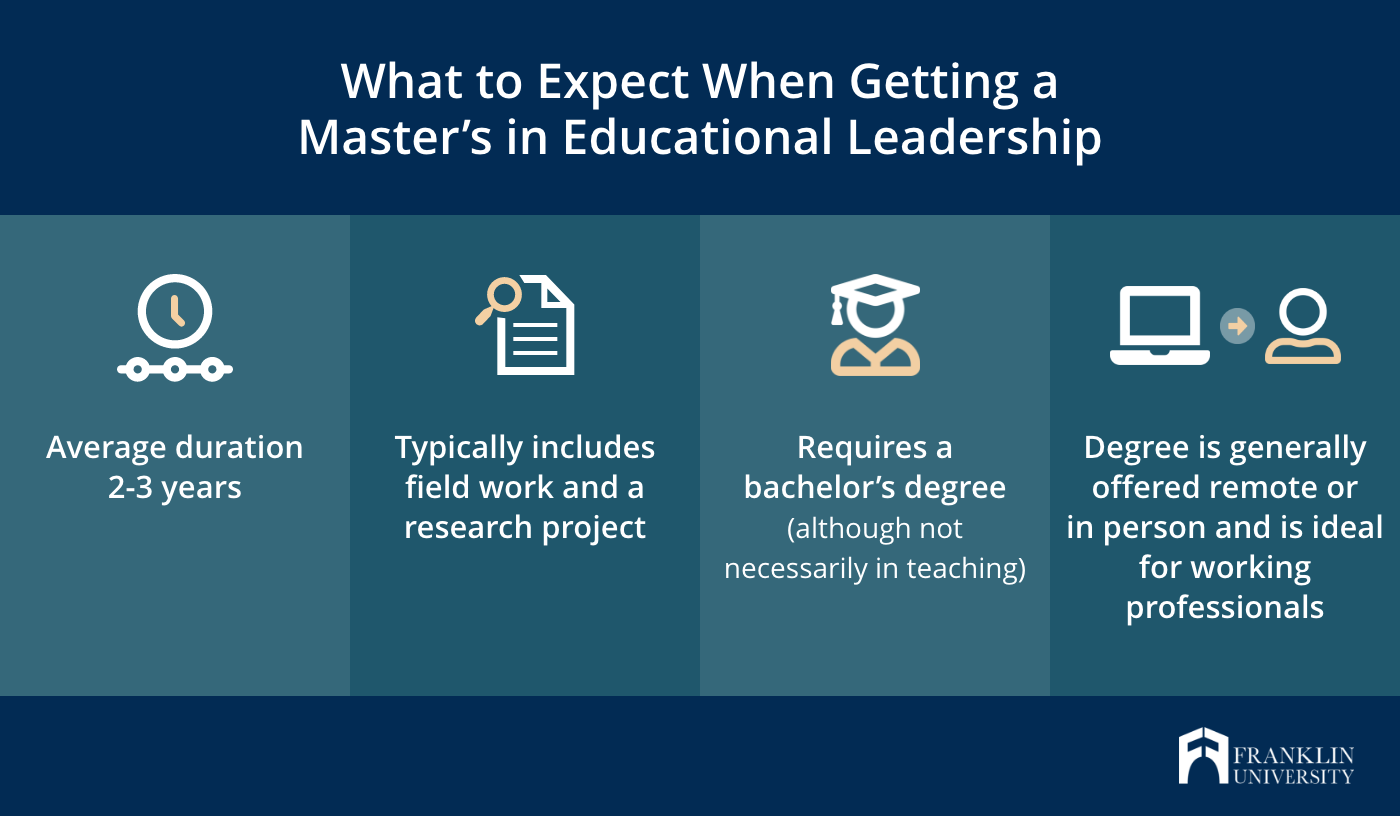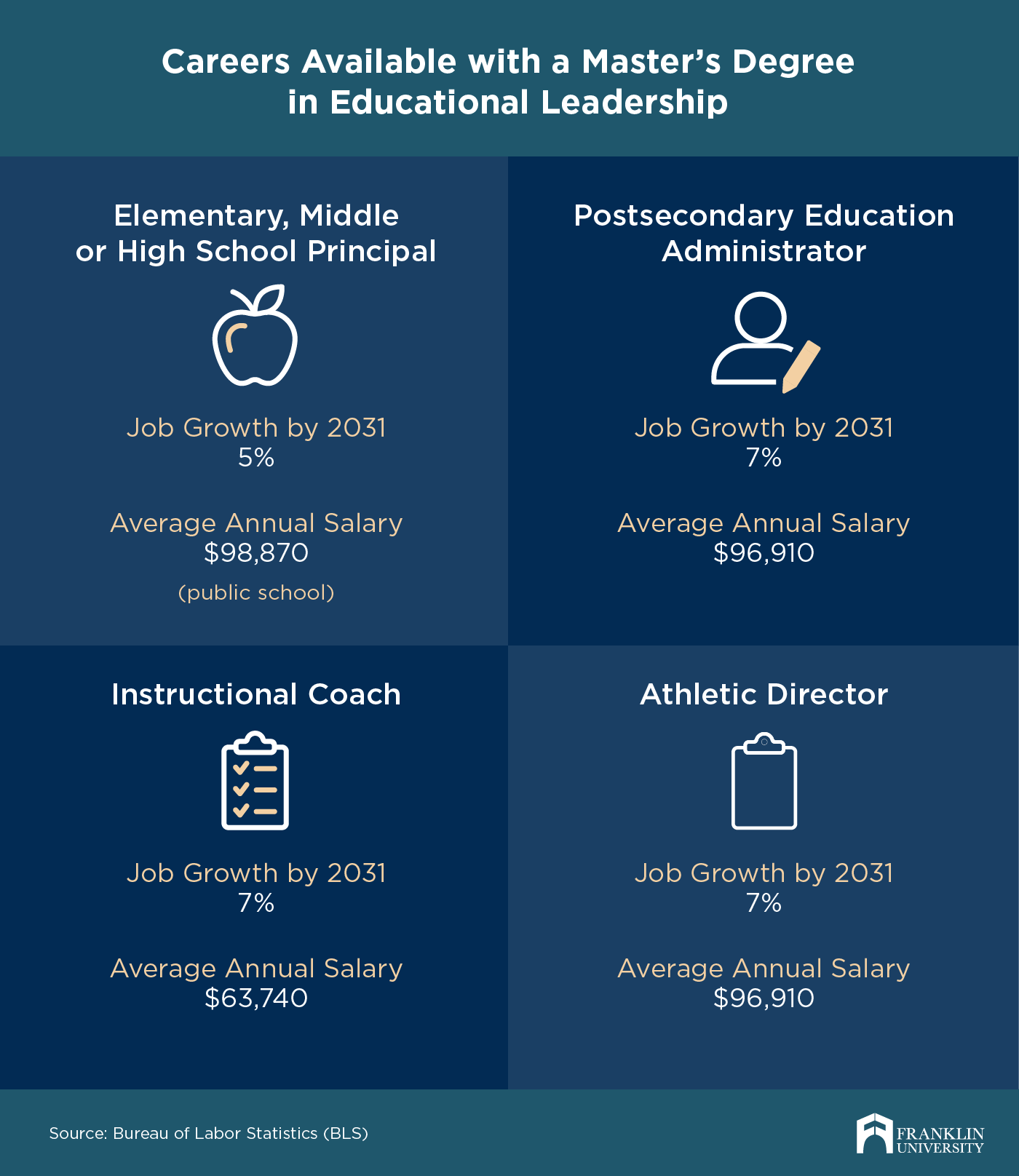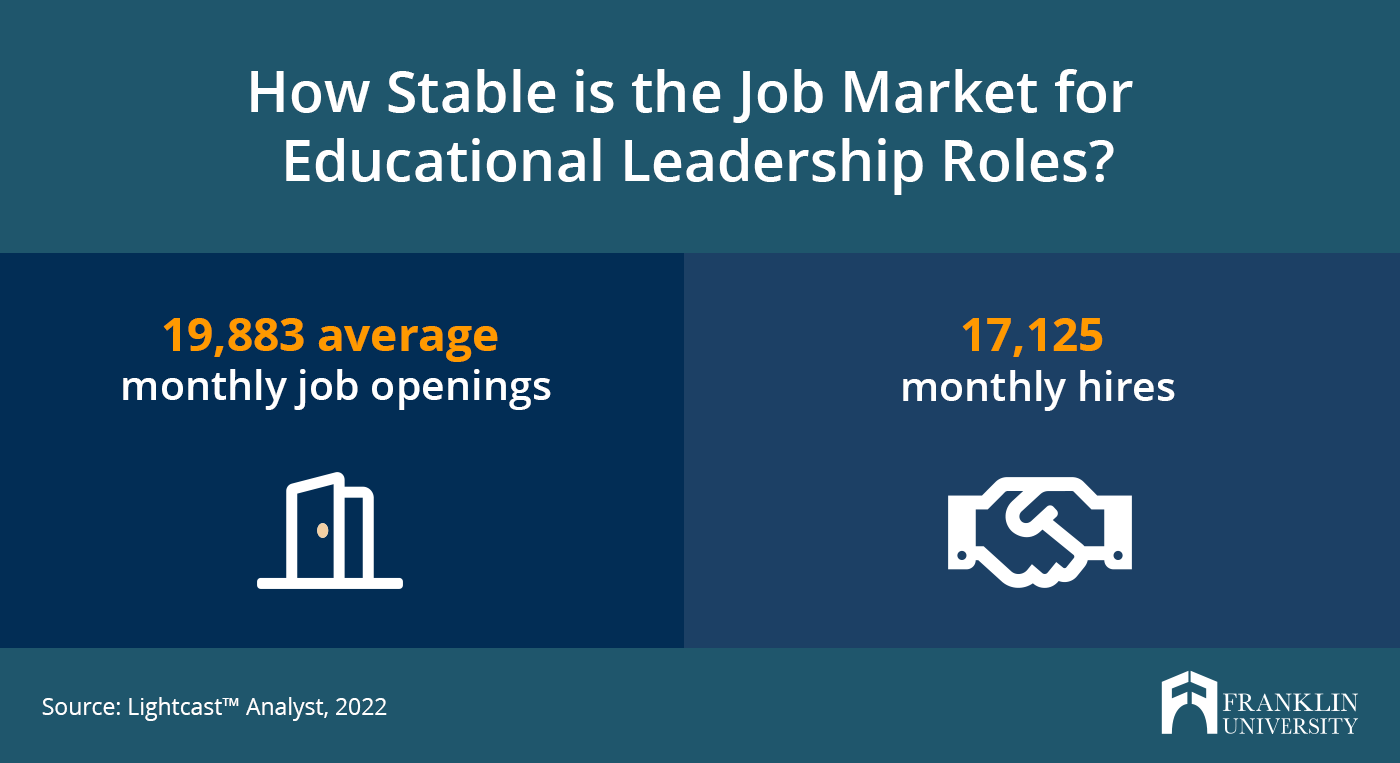Request Information
We're Sorry
There was an unexpected error with the form (your web browser was unable to retrieve some required data from our servers). This kind of error may occur if you have temporarily lost your internet connection. If you're able to verify that your internet connection is stable and the error persists, the Franklin University Help Desk is available to assist you at helpdesk@franklin.edu, 614.947.6682 (local), or 1.866.435.7006 (toll free).
Just a moment while we process your submission.

What Can I Do With a Master’s in Educational Leadership?
Educational leaders are the critical component needed to create and maintain a positive culture and develop effective education and training programs within an organization. These leaders are needed in a variety of fields, and a master’s degree with a focus in educational leadership can be applied to a variety of in-demand professional careers in schools, nonprofits and even museums.
Leadership is important at every level of an organization, but it’s more than just titles, according to Dr. Patrick Bennett, vice president of Academic Quality and Planning and Dean of the School of Education at Franklin University.
“Leadership isn’t just principals and vice principals; it isn’t just granted authority,” Bennett said. “It also includes followers. That’s an important concept here.”
A master’s degree in educational leadership will teach you the knowledge and skills to lead effectively at any scale and in any setting. Whether you want to be a teacher leading an initiative or a principal leading an institution, this degree would be a good fit for you.
What is a Master’s in Educational Leadership?
A master’s degree in educational leadership provides the knowledge and training for a variety of leadership positions, with many programs offering PK-12 building-level leadership and higher education leadership specializations, and others further focusing on specialties like counseling, athletic director, curriculum and instruction, superintendent and more. Some schools offer certifications or licensures after completion of these programs. These degrees are not specific to leadership positions in schools and can translate to a number of other industries.

There are three types of master’s degrees that set you up well for educational leadership:
- Master of Arts (M.A.) in Educational Leadership
- Master of Science (M.S.) in Educational Leadership
- Master of Education (M.Ed.) in Educational Leadership
An M.A. in Educational Leadership focuses on the theory of leadership. This degree examines the socioeconomics and politics of the community and develops an understanding of organizational structure theories and leadership theories. This degree can be used both for teachers seeking to better their classrooms through deeper understanding of educational practices, and by future leaders seeking to understand the theory and practices of leadership.
An M.S. in Educational Leadership focuses on developing practical skills. It provides you with skills, knowledge, and often field experience in leadership. Many of these programs end with principal or superintendent licensure.
An M.Ed. in Educational Leadership focuses both on the theory of leadership and on developing practical skills. This degree is well-rounded and can be a fit for administrative positions and for teachers planning to lead initiatives, programs, or are looking to be a better leader in the district.
All of these programs require successful completion of a bachelor’s degree, however they are not exclusive to teaching degrees. Though a lot of students within masters of education programs already work in the field, this is not a requirement to pursue this degree.
The average duration for all of these degrees is two to three years, however there are accelerated programs, like Franklin University’s M.Ed. program, which can be completed in as few as 12 months.
Get a FREE education career action plan filled with resources and recommendations from those who are already there.
Master’s in Educational Leadership Coursework
Master’s in educational leadership coursework teaches the foundations of leadership, ethics, critical issues in education, educational research, leadership theory, practicum in educational leadership and often includes field work.
Additionally, this degree will help advance nonacademic skills that are preferred for most education careers. These include:
- Communication skills
- Critical-thinking skills
- Decision-making skills
- Interpersonal skills
- Leadership skills
- Problem-solving skills
What Careers are Available with a Master’s in Educational Leadership?
A master’s in educational leadership will set you up well for leadership positions in a variety of sectors. According to the Bureau of Labor Statistics (BLS), the most common educational leadership positions are:

Elementary, Middle, or High School Principal
Job Function
Principals set and oversee academic goals school-wide, and oversee school operations to ensure teachers have the resources to meet those goals. In public schools, principals are also responsible for implementing the standards and programs set by the school district, state, and federal government. They are the public figurehead of the school, so they should expect to listen to and address the concerns of parents and the community. Depending on the size of the school and resources available, principals may take on additional responsibilities such as establishing and supervising extracurricular activities, and may have an assistant principal to share in the responsibilities. Some master’s in educational leadership programs have principal licensure included whereas others will require licensure after degree completion.
Job growth
The principal occupation is expected to grow under the nationwide average at 5% by 2031. Most openings are expected to result from retirement and shifting occupations.
Salary
The median wage for principals, regardless of elementary, middle, or high school, is $98,870 for public schools and $79,780 for private schools as reported by the BLS in May 2021. The lowest 10% earn below $61,480 and the highest 10% earn $153,520.
Postsecondary Education Administrator
Job Function
Postsecondary education administrators can hold a variety of positions such as dean of students, admissions officers, registrars, provosts or student affairs. Their responsibilities vary based on their job title and school size. They often oversee student services, academics, research, set departmental budgets and provide support to both students and faculty members.
Job Growth
The postsecondary education administrator occupation is expected to grow 7% by 2031, with the bulk of growth in admissions, student affairs and registrars. This growth is due to an expected nationwide increase in student enrollment. Deans and provosts have slower growth projection because there’s typically a set amount per school regardless of student body growth. Deans and provosts will still see growth over the next 10 years, however it will be largely the result of retirement and shifting occupations.
Salary
The median annual wage for postsecondary education administrators was $96,910 in May 2021. The lowest 10% earned less than $59,150, and the highest 10% earned more than $190,770.
Instructional Coach
Job Function
Instructional coaches oversee school curriculums and teaching standards. They serve as role models for teachers and ensure they stay current on teaching methods and technology. They develop instructional material, manage implementation and assess its effectiveness. They may work in government, K-12, colleges and educational support services.
Job Growth
The instructional coach occupation is expected to grow 7% by 2031, on par with the national average for all occupations.
Salary
The median annual wage for instructional coaches was $63,740 in May 2021. The lowest 10% earned less than $38,390, and the highest 10% earned more than $101,090.
Athletic Director
Job Function
Athletic directors work with academic and administrative leadership to direct and manage all aspects of an athletic program. This includes staff, budget, operations, compliance and community relations.
Job Growth
The athletic director occupation is expected to grow 7% by 2031, on par with the national average for all occupations.
Salary
The median annual wage for athletic directors was $96,910 in May 2021. The lowest 10% earned less than $59,150, and the highest 10% earned more than $190,770.
Career Growth, Stability and Salary
Career Growth
Educational leadership jobs overall are expected to grow 4% by 2029, with most of this growth due to retirement, but some positions like admissions officers, registrars, counselors and student affairs workers will experience growth in response to growing student bodies in school.
Stability

According to Lightcast™, there are 19,883 average monthly job openings for educational leadership positions and 17,125 monthly hires. These jobs span multiple industries, such as education in K-12 schools, higher education, nonprofits, government, museums, historical sites and similar institutions.
Salary
According to the BLS, the average salaries for common leadership positions are:
- $96,910 per year for higher education leadership
- $98,420 for K-12 leadership
- $74,060 educational administrators in museums, historical sites and similar institutions
What Is the Right Program for Me?
Master’s in educational leadership programs provide many promising career opportunities within a variety of fields. There are plenty of master’s in education leadership programs, and Dr. Bennett recommends diving into the curriculum to choose which one is right for you
“The important piece is to look at the curriculum and what is being covered,” he said. “What we do is we provide our course descriptions, and we value the experience the learner is bringing in. Our curriculum is established in a way where they get to bring the student’s teaching experiences into our curriculum and we value that and they get to share that with the other students in their class and learn from them”.
Franklin University’s M.Ed. program is a fully-remote 12-month accelerated program taught by real-world practitioners that encourages a culture where students can learn from engaged and caring faculty, and from other students in the classroom.





